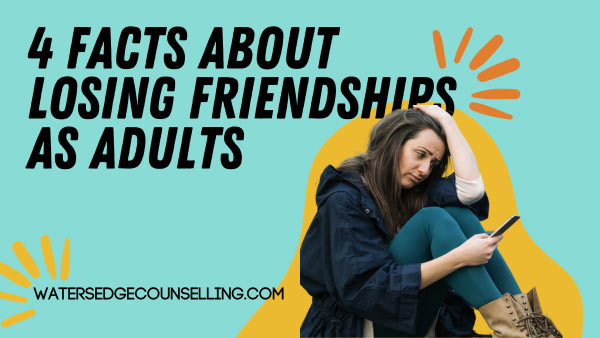
As a kid, many of us assume that the close friends we make will be forever. And while we tend to stay connected with one or two, as we enter adulthood, we realise friendships change. Whether you drift apart, move interstate or have a falling out, the friendships we lose as adults have a heavy grief associated with them. Partly, because we never expected the friendship to end. Saying goodbye to that person feels like we are saying goodbye to a significant chapter of our life. Especially if a person was present during our pivotal years as a teenager, or at a wedding. How do we move to n from these lost friendships? Can you relate? Then this is for you.
- Sometimes friendships end naturally
Some people carry a sense of guilt when friendships end. Thoughts of “I should have done more,” or “if only,” can come up. Before you guilt trip yourself, ask if your relationship has run its course. As we grow and our lives change, we see less of people and can have less in common. Sometimes there is no malice involved. In fact, you may still be friends, albeit less close ones. In any case, what you had looks different now and that’s ok. But that won’t change the grief and pain you may feel. Give yourself permission to process it. There doesn’t have to be a good guy and bad guy in this scenario – this is just life.
- We don’t have the same capacity for some friendships that we did in the past, so they will end.
This is a hard truth to swallow, but as our lives change and our responsibility increases, we have less capacity to invest in friendships. Even if we want to spend quality time with everyone we value, it’s impossible on a semi regular basis. Especially if you no longer run in the same social circles. As a general rule, most adults will have a few close friends and likely even less they’ll see regularly. So, give yourself a break. If you still want to retain this friendship, speak openly and honestly with them about what your relationship looks like now. It’s okay not to have the space and time to please everyone. We all have to learn this as we grow older.
- You shouldn’t blame yourself for what you didn’t know before
Sometimes we are years or decades into a relationship, when we realise it isn’t healthy. We start to pick up on patterns of bullying or manipulation. We realise we are always the one to blame or that we are expected to do all the work. Maybe you were cut off from people and controlled. It is easy to think, “How did I not realise what was happening years ago?” In these cases, we wish we could rewrite the past. But you can’t blame yourself for not knowing what you now know. You did the best with what you had and tried to make the healthiest decisions possible. With new information and wisdom, your next big step was to cut off that friendship. There could be anger, relief and fear as you process this lost friendship. Don’t demonise yourself for feeling conflicting emotions – your body and brain are beginning to heal.
- Sometimes we need to have hard conversations
There are some friendships that ease off naturally. There are others that have to be dealt with, whatever the outcome. This happens when you see each other semi regularly, were formerly in regular contact (it’s best not to ghost them unless it’s a safety concern), or if you have mutual friends. In these cases, determine what your nonnegotiable are (values, behaviour, capacity etc) and bring them to the person. See if they will meet you halfway in this friendship and try to make it work or agree to be civil when you’re around one another. If the other person refuses to communicate with you, you know you’ve taken your side of the responsibility. And if you talk and things don’t pan out, own your power and still have compassion on the other person. You’re not a doormat, but this doesn’t have to be a blood bath if you can help it.
Are you grieving a friendship? Would you like support as you navigate changing relationships and boundaries ? Contact Colleen on 0434 337 245, Duncan on 0434 331 243 or Rachel on 0442177193 for a FREE 10-minute phone consultation on how we can best help you, or press book now and make an appointment.
The post 4 facts about losing friendships as adults appeared first on Watersedge Counselling.
